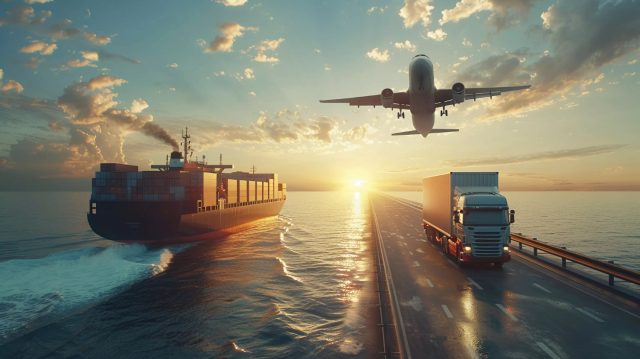Introduction:
When it comes to international shipping, businesses must decide between two primary modes of freight transport: sea and air. Each mode has its unique advantages, and choosing the right one can impact everything from delivery times to shipping costs. At Easyway Logistics, one of the top freight forwarding companies in Chennai, we help businesses make informed decisions that best align with their logistics needs.
In this blog, we will explore the differences between sea and air freight, including cost, speed, reliability, and environmental impact. By understanding these factors, businesses can make the best choice for their shipping requirements.
Air Freight:
Air freight involves transporting goods via cargo planes and is known for its speed and reliability. Here are the reasons businesses might choose air freight over sea freight.
1. Speed
The most significant advantage of air freight is speed. For businesses that need their products delivered quickly, air freight is the best choice. It allows goods to be shipped across continents within days, making it ideal for perishable goods, time-sensitive materials, or urgent orders.
2. Reliability
Air freight offers more reliable delivery schedules compared to sea freight. Air traffic is less likely to be affected by bad weather, and most airlines have strict schedules. This predictability makes air freight a dependable option for businesses with tight deadlines.
3. Less Risk of Damage
Shipping goods via air freight reduces the risk of damage. With shorter transit times and minimal handling, goods are less likely to be mishandled, lost, or damaged in transit.
4. Higher Security
Airports and air cargo facilities have strict security measures, reducing the risk of theft or loss of goods. Businesses shipping valuable or sensitive items often prefer air freight for this reason.
Challenges of Air Freight
Higher Costs: Air freight is significantly more expensive than sea freight, making it unsuitable for large, low-value goods.
Limited Cargo Capacity: Planes have lower capacity compared to ships, making it difficult to ship oversized or extremely heavy items.
Environmental Concerns: Air freight has a much larger carbon footprint compared to sea freight, contributing more to environmental pollution.
Sea Freight:
Sea freight is the most common mode of international transport, especially for large shipments. It involves transporting goods via cargo ships over long distances. Let’s look at some key advantages of choosing sea freight.
1.Cost-Effectiveness
Sea freight is generally much cheaper than air freight, especially for large or heavy cargo. Ships have the capacity to carry massive amounts of goods, reducing the per-unit cost of transport. This makes sea freight ideal for businesses shipping large volumes of products, such as furniture, industrial equipment, or bulk commodities like grains or minerals.
2. High Capacity for Large Shipments
Sea freight offers much higher capacity compared to air freight. Businesses can ship large amounts of goods in one go, as cargo ships can accommodate vast containers. This is especially beneficial for industries that rely on bulk shipments.
3. Global Accessibility
With a vast network of sea routes, almost every country in the world has access to sea freight services. Ports are located in strategic positions globally, allowing businesses to ship goods to and from even the most remote areas.
4. Environmental Impact
While sea freight is slower than air freight, it is a more environmentally friendly option. Ships emit significantly less CO2 per ton of cargo compared to planes, making sea freight a greener choice.
5. Flexibility in Shipping Options
Sea freight offers various shipping options, including Full Container Load (FCL) and Less than Container Load (LCL). This flexibility allows businesses to ship either full containers or smaller consignments depending on their requirements.
Sea vs. Air Freight: Factors to Consider
When deciding between sea and air freight, businesses need to consider several factors:
1. Cost
Sea freight is more cost-effective for large or heavy shipments, while air freight is better suited for smaller, high-value, or time-sensitive goods.
2. Speed
If fast delivery is a priority, air freight is the obvious choice. However, if time is not a concern, sea freight provides significant cost savings.
3. Nature of Goods
Perishable or high-value goods are often shipped via air freight due to their sensitivity and need for quick delivery. For durable, non-perishable goods, sea freight is a more practical and affordable solution.
Conclusion
At Easyway Logistics, we understand that no two businesses are the same, and neither are their shipping requirements. We offer both sea and air freight services in Chennai, helping our clients choose the mode that best suits their needs.
Our experienced team of freight forwarding specialists will guide you through the entire process, from documentation to customs clearance, ensuring that your goods reach their destination on time and in perfect condition. Whether you are shipping small, urgent packages via air or large, bulk shipments via sea, Easyway Logistics has the expertise and infrastructure to meet your needs.
Frequently Asked Questions (FAQ)
1. What is the primary difference between sea and air freight?
The main difference is speed and cost. Air freight is faster but more expensive, while sea freight is slower but more affordable, especially for large shipments.
2. How do I choose between sea and air freight?
It depends on your priorities. If you need fast delivery and are shipping smaller goods, air freight is ideal. For cost-effectiveness and larger shipments, sea freight is a better choice.
3. Does Easyway Logistics offer both sea and air freight services?
Yes, Easyway Logistics provides both sea and air freight services to meet various business needs.






